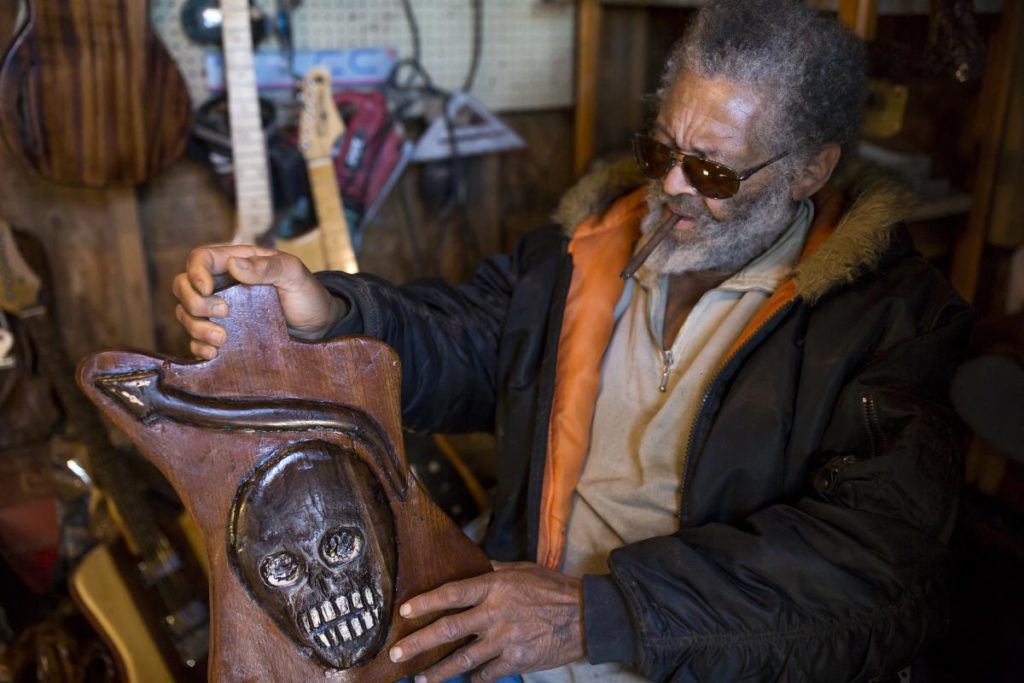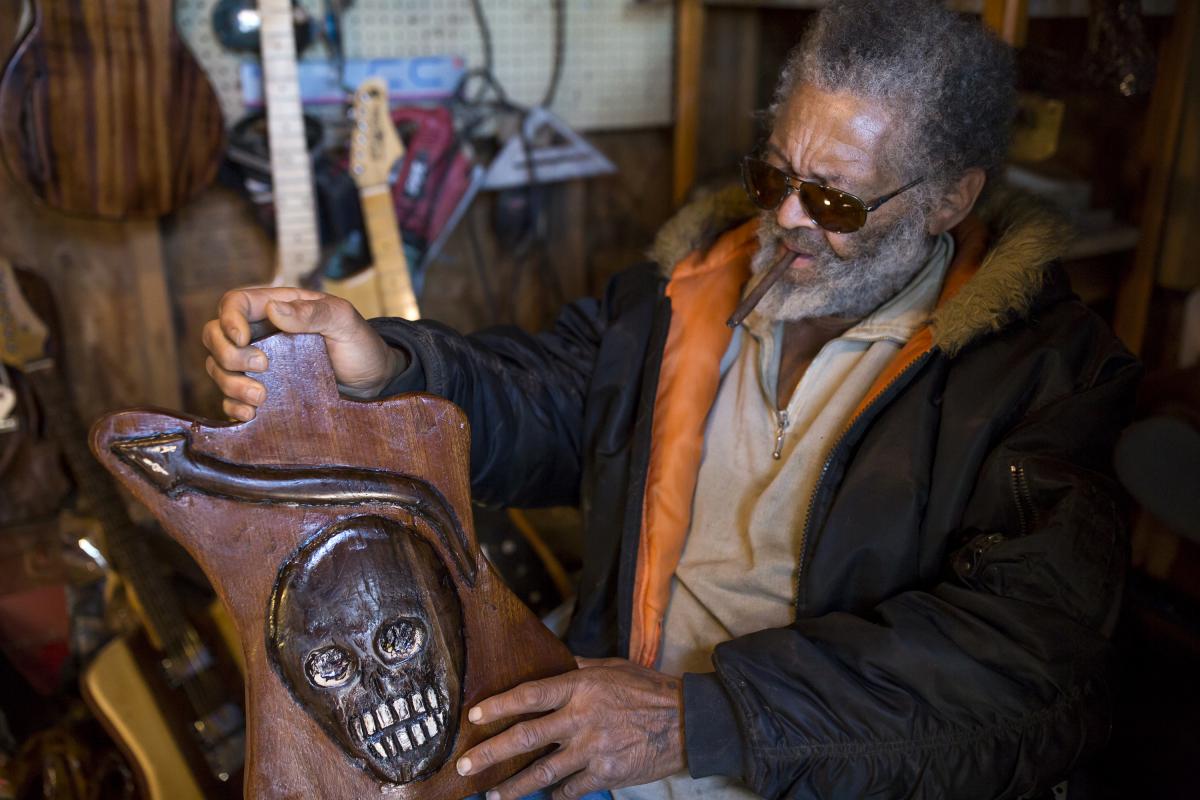by Leoneda Inge, WUNC North Carolina Public Radio (Aug. 6, 2019). Leoneda Inge reports on the Music Maker Relief Foundation, which has helped improve the lives of more than 400 artists for the past 25 years. Listen to the audio report.

Freeman Vines holds a guitar that he carved out of wood thought to be from a tree that was used as a “hanging tree” in lynchings. Vines says that the image of the skull was already a part of the wood and he just listened to the wood to bring it out. CREDIT MADELINE GRAY / FOR WUNC
The life of an aging blues or folk musician is not always pretty. Many of these old soulsters have not been able to retire with dignity. For the past 25 years, the Music Maker Relief Foundation has worked to improve the lives of these musicians. It has literally saved the lives and the music of more than 400 artists.
Many of these artists are African American and well over regular retirement age. One of them is Freeman Vines, who lives in eastern North Carolina, between Greenville and Farmville.
“I’m Freeman Vines. And that’s about it. That’s just it,” Vines said as he sat in his work shed, with an unlit cigarette in his mouth, which looked hand-rolled.
His only companion these days seems to be an old dog named Mudd, that doesn’t bark much and won’t leave his side.
“Mudd! He got a problem. When he sees white folks he go crazy!” said Vines as his shed filled with folks. “His mom and dad are fighting dogs.”
Vines is 77 years old, but looks a bit older. His mostly grey and black hair is wild, and so is his bushy beard. His clothes look like he’s worn them more than twice.
I played music here, and I played music there. I have done gospel music,” said Vines. “I done some of everything like that, but I never considered myself a retired guitar player.”
Vines mostly played shot houses and front porches in the 1960s. He also fixed cars. That’s how he made a living. But he loves the guitar.
“I don’t know if I was sitting there or looking there, and take a drink too, you know. And I heard this sound, and I started messing with wood and different sounds, and sounds, and sounds,” said Vines. “And then I never found the sound no more, and then I found out I could construct a guitar, by doing all that and everything.”
Vines’ poor health got in the way of him playing the guitar and working at all. He has diabetes, which has affected his eye sight. But on a good day, Vines designs and builds guitars, made from meaningful pieces that have been used before.
“Tim was the cause of that, because I about gave up,” said Vines. “He got interested in them. And I just tend to be makin’ them.”
Vines is talking about Tim Duffy, founder and president of the Music Maker Relief Foundation, based in Hillsborough. Duffy is fascinated by Vines’ guitars.
The way he talked, was just brilliant and he was a great conversationalist. And then he started pulling out all these guitars and then I would find guitars like under piles,” said Duffy. “There would be bodies under there. They would be here. Since then we have pulled out over 80 guitars and 135 pieces in the collection.”
And most notably, some of Vines’ guitars are made from what they call “hanging tree” wood, wood from a nearby tree where it was said that a black man was lynched many years ago.
The mission of the Music Maker Relief Foundation is to preserve the musical traditions of the South by ensuring musicians voices “will not be silenced by poverty or time.”
“When I met him he was very sick,” said Duffy, looking over at Vines. “You have to meet artists where they want to be met and do what they want to do.”
And that could include everything from re-releasing songs and going on tour to buying diabetes medicine. Most of the musicians supported by Duffy and Music Maker are African American and over the age of 60. They include Beverly “Guitar” Watkins, Ironing Board Sam, and Freeman Vines’ sisters, known as the Glorifying Vines.
Alice Vines has been singing with her sisters and other family members for 42 years. “I mostly stay in the background. My other two sisters are the leaders,” said Alice Vines, preparing to perform at an event at The Regulator Bookshop in Durham earlier this year.
She says her family’s gospel group has also benefitted from Music Maker. “They put us on the road. We weren’t going nowhere,” said 69-year-old Alice Vines. “We just like family, I never met nobody like them [Music Maker] before.”
A new book called “Blue Muse – Timothy Duffy’s Southern Photographs,” was published this year. It features photographs of Blues, Jazz and Folk artists taken in the tintype method, popular in the 1860s and 1870s. A photo of Freeman Vines and his unique guitars are included.
And even though Vines does not like to wander too far from his North Carolina home, his guitars will be included in a 2020 exhibit at Turner Contemporary, one of the leading art galleries in the United Kingdom. Vines says he wants a passport, so he can attend.
Leoneda Inge, race and southern culture reporter at WUNC North Carolina Public Radio, produced this story supported by a journalism fellowship from the Gerontological Society of America, Journalists Network on Generations and AARP.
The opinions expressed in this article are those of the author and do not necessarily reflect those of the Diverse Elders Coalition.

